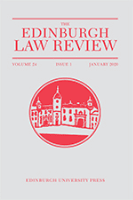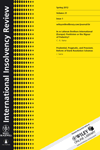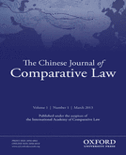
Insolvency Law Journal
Scope & Guideline
Navigating the complexities of insolvency law.
Introduction
Aims and Scopes
- Insolvency Legislation and Policy:
The journal consistently examines the evolution of insolvency legislation and its implications for legal practitioners and stakeholders, providing critical insights into statutory frameworks and their application. - Judicial Decisions and Case Law Analysis:
A significant focus is placed on analyzing landmark judicial decisions and their repercussions on insolvency practices, offering a thorough understanding of how courts interpret insolvency laws. - Comparative Insolvency Law:
The journal highlights comparative studies of insolvency law across different jurisdictions, helping to identify best practices and potential reforms in local insolvency frameworks. - Practical Applications and Professional Insights:
Contributions often include discussions on the practical implications of insolvency law for practitioners, including liquidators, trustees, and legal advisors, ensuring the research is relevant to real-world applications. - Corporate Governance and Accountability:
The journal explores the intersection of insolvency law with corporate governance, emphasizing the responsibilities of directors and the accountability mechanisms in place during insolvency proceedings.
Trending and Emerging
- Cross-Border Insolvency Issues:
Recent publications increasingly address the complexities of cross-border insolvency, highlighting the need for harmonization of laws and protocols as businesses operate in an interconnected global economy. - Corporate Rescue and Rehabilitation Strategies:
There is a rising interest in corporate rescue frameworks, focusing on mechanisms that enable distressed companies to recover rather than liquidate, reflecting broader economic trends towards sustainability and recovery. - Stakeholder Protection and Rights:
Emerging themes emphasize the protection of various stakeholders in insolvency proceedings, particularly focusing on the rights of creditors and employees, indicating a shift towards more equitable insolvency practices. - Impact of Technology on Insolvency Processes:
The influence of technology, including digital platforms and artificial intelligence, is becoming a significant topic, as the legal profession adapts to innovations that can streamline insolvency processes and improve outcomes. - Regulatory Frameworks and Compliance Challenges:
There is a growing focus on the implications of regulatory changes and compliance challenges faced by insolvency practitioners, reflecting an increased scrutiny of professional practices in the industry.
Declining or Waning
- Historical Analyses of Insolvency Law:
There has been a marked decrease in publications focusing on historical perspectives of insolvency law, suggesting a shift towards more contemporary issues and practical implications rather than historical contexts. - General Discussions on Bankruptcy Offences:
Papers centered on bankruptcy offences and related punitive measures appear to be less frequent, indicating a potential waning interest in this area as more emphasis is placed on reformative and preventative measures. - Theoretical Perspectives on Insolvency:
Theoretical explorations of insolvency, such as economic analyses devoid of practical application, are less commonly found, suggesting a trend towards more practical, actionable research that addresses current challenges faced by practitioners.
Similar Journals

Revista Espanola de Derecho Constitucional
Advancing Legal Scholarship in a Changing WorldRevista Española de Derecho Constitucional is a prominent academic journal dedicated to the field of constitutional law, published by the CENTRO ESTUDIOS POLITICOS CONSTITUCIONALES. This esteemed publication serves as a vital resource for researchers, scholars, and practitioners interested in the evolving landscape of constitutional frameworks, legal theory, and the intersection of law with societal issues. With an ISSN of 0211-5743 and E-ISSN of 1989-0648, the journal has been indexed in major databases, securing a respectable position with a Q2 ranking in Law and Q3 in Sociology and Political Science as of 2023. The journal, based in Madrid, Spain, showcases critical research, case studies, and theoretical discussions that contribute to the understanding of constitutional dynamics, particularly within the Spanish context and beyond. Although it follows a subscription model rather than open access, the rigorous peer-review process and the high academic standards upheld by the journal ensure that its contributions have a significant impact on the scholarly community. With a focus on interdisciplinary approaches and the application of legal principles to contemporary challenges, the Revista Española de Derecho Constitucional is positioned as an essential platform for knowledge exchange and intellectual discourse in the realm of constitutional law.

Journal of Banking and Finance Law and Practice
Exploring Contemporary Challenges in Financial LawJournal of Banking and Finance Law and Practice is a premier academic journal published by LAWBOOK CO LTD, focusing on the dynamic intersection of banking, finance, law, and regulatory practices. With an ISSN of 1034-3040, this journal serves as a vital resource for researchers, legal practitioners, and students seeking to enhance their understanding of the evolving legal frameworks governing financial institutions and practices. While the journal is not open access, it provides a wealth of peer-reviewed articles, case studies, and insightful commentary that contribute significantly to the discourse in financial law. The articles featured in this journal aim to address contemporary issues and challenges within the banking and finance sectors, promoting critical analysis and innovative solutions in the legal sphere. As a result, Journal of Banking and Finance Law and Practice holds an important place in scholarly communication, fostering knowledge exchange while shaping future legal practices in finance.

Tydskrif Vir Die Suid-Afrikaanse Reg
Elevating Legal Scholarship in South AfricaTydskrif Vir Die Suid-Afrikaanse Reg, published by JUTA & CO LTD, is a vital scholarly journal contributing to the field of legal studies in South Africa. With an ISSN of 0257-7747 and E-ISSN of 1996-2207, this journal offers an academic platform for the publication of peer-reviewed articles addressing various facets of law, including case law analysis, legal theory, and regional legal practices. While currently positioned in the Q4 quartile of the 2023 Scopus rankings for Law, having a rank of #819 out of 1025, it provides an essential resource for research and discussion, aiming to elevate the quality of legal scholarship in the area. Even though it does not provide open-access options, its comprehensive coverage and commitment to advancing legal knowledge make it a significant asset for researchers, professionals, and students alike, particularly those interested in navigating the evolving landscape of South African law. The journal's content spans converged years from 2009 to 2024, ensuring a rich history of legal discourse and insight.

Edinburgh Law Review
Engaging scholars and practitioners in the evolving landscape of law.Edinburgh Law Review is a distinguished journal published by Edinburgh University Press, dedicated to advancing discourse in the realm of law, cultural studies, and history. With its ISSN 1364-9809 and E-ISSN 1755-1692, this journal has been contributing valuable scholarly content since its inception in 1997, and it continues to be a vital resource for researchers, legal practitioners, and students alike. Although it currently does not provide Open Access options, the journal's rigorous peer-review process ensures that each article meets the highest academic standards. Known for its diverse range of topics, the Edinburgh Law Review holds a Q4 ranking within its categories in Cultural Studies, History, and Law in 2023, reflecting a commitment to engaging with contemporary issues in these fields. With a noticeable presence in Scopus rankings, this journal is essential for those seeking to deepen their understanding of the intersections of law, culture, and history within a British context.

International Insolvency Review
Illuminating the Intersection of Law and FinanceInternational Insolvency Review is a pivotal journal in the fields of finance and law, published by WILEY. Established in the early 1990s, this journal serves as a platform for the dissemination of innovative research and critical discourse surrounding insolvency law and its implications for global commerce. With a current Scopus rank of #546 in Law and #257 in Finance, it holds a respectable position despite being classified in the Q4 quartile, indicating opportunities for growth and engagement. The journal's ISSN is 1180-0518 and the E-ISSN is 1099-1107. Researchers and practitioners alike benefit from its rigorous analyses and case studies that illuminate the complexities and challenges of insolvency. Although not an open-access journal, it provides valuable insights that are crucial for academics, legal professionals, and students interested in the evolving landscape of insolvency and its regulatory frameworks. Its broad scope underscores the intersection of law and finance, contributing significantly to both academic and professional landscapes.

Teoria y Realidad Constitucional
Unraveling the Complexities of Constitutional RealitiesTeoria y Realidad Constitucional is a distinguished academic journal published by the UNIV NACIONAL EDUCACION DISTANCIA in Spain, focusing on the intricate interplays of constitutional theory, law, and political science. With ISSN 1139-5583 and E-ISSN 1139-5583, this journal has carved out an essential place in the scholarly community, as evidenced by its position in the Q2 category for both Law and Political Science and International Relations as of 2023. Its impact within the academic landscape is further underscored by Scopus rankings, which situate it among the top publications in social sciences, where it stands at rank #628/1025 in Law and #494/706 in Political Science. The journal embraces a broad scope of constitutional discourse, publishing research that contributes to the critical understanding of contemporary legal frameworks and their implications for global governance, human rights, and the rule of law. Since its convergence in 2012, it has committed to offering a platform for innovative scholarship, making it an invaluable resource for researchers, professionals, and students seeking to delve into the complexities of constitutional realities.

AUSTRALIAN BUSINESS LAW REVIEW
Analyzing the intersection of law and commerce in Australia.Australian Business Law Review, published by Lawbook Co Ltd, is a premier peer-reviewed journal dedicated to the exploration and analysis of business law in the Australian context. With the aim of enhancing legal scholarship and practical understanding in this critical field, the journal addresses a wide range of topics including corporate governance, contract law, trade practices, and regulatory frameworks, making it an essential resource for legal practitioners, researchers, and students alike. The journal is recognized for its rigorous editorial standards and relevance in shaping discussions surrounding current legal issues, reflecting the complexities of the modern business environment. Although it does not operate on an Open Access model, the Australian Business Law Review remains a vital publication that contributes significantly to the discourse on business law, ensuring its readers stay informed about the latest developments and scholarly debates.

Chinese Journal of Comparative Law
Challenging Paradigms in the Study of LawWelcome to the Chinese Journal of Comparative Law, a premier academic journal dedicated to the field of comparative law, published by Oxford University Press. Since its inception in 2013, the journal has provided a crucial platform for scholars and practitioners to engage with the intricacies of legal principles across different jurisdictions, emphasizing both traditional and contemporary issues relevant to the field. With an impact factor reflecting its influence—ranked Q2 in Law and Q3 in Economics and Econometrics—the journal continues to foster innovative research and dialogue among legal professionals. The Scopus rank positions it well within the top 69th percentile of law journals, illustrating its significant contribution to the social sciences. While not open access, the journal's commitment to disseminating high-quality, peer-reviewed research ensures it remains an essential resource for researchers, practitioners, and students interested in the evolving landscape of comparative law. As the journal converges through 2024, it invites contributions that not only challenge existing paradigms but also enhance the understanding of law in a global context.

ZBORNIK PRAVNOG FAKULTETA SVEUCILISTA U RIJECI
Exploring Innovative Legal Research and DialogueZBORNIK PRAVNOG FAKULTETA SVEUCILISTA U RIJECI, with ISSN 1330-349X and E-ISSN 1846-8314, is a distinguished academic journal published by the University of Rijeka, Faculty of Law, Croatia. Since its inception, the journal has steadfastly committed to promoting legal scholarship and fostering academic dialogue within the field of law. With an Open Access model adopted since 2006, ZBORNIK allows researchers, practitioners, and students universal access to its invaluable content, enhancing the dissemination of knowledge across borders. This journal serves as a pivotal platform for innovative legal research, covering a diverse range of topics pertinent to both national and international legal frameworks. The journal’s importance in the legal community is further underscored by its efforts to bridge theory and practice, making it an essential resource for anyone engaged in legal studies. For scholars looking to contribute to an inclusive discourse in legal academia, ZBORNIK PRAVNOG FAKULTETA is an ideal venue.

International Sports Law Journal
Advancing Scholarship in Sports Law and RegulationInternational Sports Law Journal (ISSN: 1567-7559, E-ISSN: 2213-5154) is a prominent publication in the field of sports law, published by SPRINGER HEIDELBERG. Located in the United States, this journal serves as a vital resource for researchers, professionals, and students interested in the legal aspects surrounding sports and athletics. With an impressive impact factor and ranked Q2 in Law (2023), it stands out in the academic community, holding the #230 position in the Scopus Social Sciences _ Law category, which represents the top 23% of journals in this field. The journal aims to provide a platform for scholarly discourse on a variety of subjects within sports law, including regulatory issues, international regulations, and case studies affecting athletes and sports organizations. Though it does not currently offer open access, the International Sports Law Journal is dedicated to publishing high-quality, peer-reviewed research that contributes to the development of sports law scholarship, thereby enhancing understanding and practice in this dynamic area.